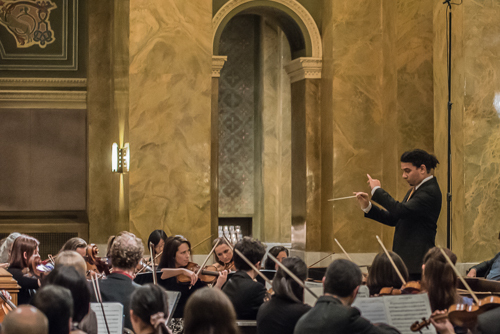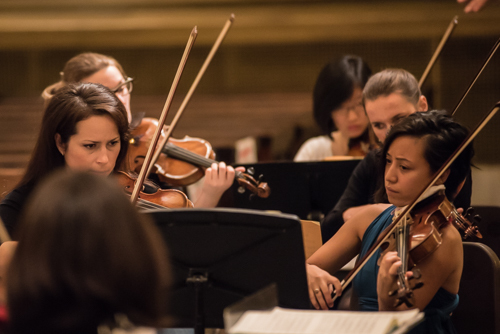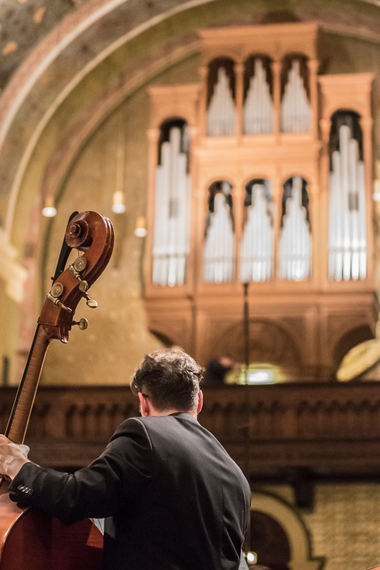
Mina Zikri is a lot like other artists, or at least he's a lot like other promising, new artists who you might not know about. When you see him perform, for example, not only is the intensity of his dedication immediately clear, but as is often true with very creative performers, there's likely to be a sense of surprise in the blend of impressions that he brings to an audience. Mina Zikri is doing something else that promising new artists sometimes manage to do. He's quietly gathering around him a group of other artists, like-minded people inspired by what he imagines, and dedicated to making what he imagines real.
As far as being a lot like other artists, though, that's about it, because Mina Zikri is unique in so many ways. His approach to his art is unique, his background is unique, and his journey from the music schools of Cairo to the classical concert halls of Chicago and the world is, and continues to be, a uniquely promising adventure. Like many gifted artists, you get the impression that everything he does is part of a coherent, reaching vision, yet even in that there's something unusual. Zikri's vision actually has a name; it's called The Oistrakh Symphony of Chicago, a group of richly talented classical performers that Zikri describes as 'youthful' rather than 'young'.
"The orchestra is very special in the sense that it's all youthful people," he explains. "I say 'youthful' because some of them are not necessarily very young, and the young ones are not going to stay young forever." Age is not especially important to Zikri. Many of the artists he admires most, artists like Daniel Barenboim and Cliff Colnot, are older than he is, but they're artists who are always ready to change, if something different is better. That's what Zikri means by 'youthful', and it offers an important insight into what he's trying to do.
Mina Zikri is a conductor, the kind of promising young conductor who could be traveling the world full-time performing with international orchestras; in August he traveled with Daniel Barenboim as the backstage and assistant conductor for Wagner's "Tristan and Isolde" on a tour that took them to Europe and South America (performing at The Salzburg Festival in Austria, at The Lucerne Festival in Switzerland, and at Buenos Aires' legendary Teatró Colón), and he returns each season to his native Egypt to guest-conduct the Cairo Symphony. He could be doing a lot more of that, but because his vision of what music can be, and what it should be, is so clear, he chooses not to. Instead, he founded the Oistrakh Symphony of Chicago (originally as 'The Oistrach Symphony Orchestra', the orchestra changed its name at the end of 2014). At a time when even some of the greatest orchestras in the United States are failing under the immense pressures of financial and cultural uncertainty, Zikri believes that the future of symphony orchestras can be, should be, and must be different from what everyone seems to expect.
Zikri began studying the violin at the age of eight in his native Cairo, and by the time he was eleven, he knew that he wanted to be a classical musician; he says now of that youthful decision, "I never looked back." When Israeli conductor Daniel Barenboim and Palestinian-American writer Edward Said founded the West-Eastern Divan Orchestra as a place for young musicians from all the countries of the Middle East to work together, Zikri's was one of the hundreds of audition tapes that they received from conservatory students across the region.
How to Imagine a Symphony Orchestra: Mina Zikri and The Oistrakh Symphony of Chicago from aotpr.com on Vimeo.
He joined the West-Eastern Divan Orchestra in 1999, and he continues to tour and perform with them around the world. Joining the legendary orchestra in its first year wasn't just an extraordinary opportunity, it was an exceptional set of experiences. Among the people that he met were conductor Daniel Barenboim, at that time Music Director of the Chicago Symphony Orchestra, and Chicago Civic Orchestra conductor Cliff Colnot. He was able to enroll in the School of Music at Chicago's DePaul University, first as an undergraduate, and then as a graduate student. Like young classical musicians at universities and conservatories across America, he worked with other gifted young musicians, building the beginning of a very promising career in the hopeful world of academic optimism.
Except there were problems, very real problems. "When I was graduating, there were all of these highly trained musicians," he explains, "but then they get out of school, and there is no work, no market, and nobody wants their music or their training." It's damaging, to a society that Zikri believes urgently needs music to be a part of every individual, to audiences increasingly deprived of great music, but especially, to each of those young artists. "People become bitter, it's as if someone has just crushed all of your dreams, all of what you thought your life was going to be," he continues, "and I just refused to see my dreams being crushed."
It's a reality that many people can see, but one of the things that makes Zikri and the Oistrakh Symphony so unique is the unusually thoughtful way in which they defy it. It begins with Zikri's understanding of what music is, and what it can be, and builds coherently on that understanding with insight into how musicians make music together, and what makes the best music for an audience.
"The message that the orchestra brings is that music is a necessity," he says unequivocally. "It's an essential part of life, it's part of the structure of being a person." Zikri's understanding of music, in the sense of music theory, is careful and thorough, as you would expect from an artist so rigorously trained. When you talk with him, his insight and reflections on important composers, or how different schools and styles of music have succeeded one another, often find effortless context in the conversation, but his real understanding goes deeper. He understands how people make music together.
It begins with being a professional, and notwithstanding his own high standards of professionalism, his view on that is characteristically unique. "With music, you can only be professional to a certain level," he says, "if you want to be an artist, you have to stop being a professional." At first, it's an astonishing assertion, but like so many of Zikri's precise perceptions, it's well thought out. "When you're a professional, you know your minimum, and that's not good," he goes on to explain, "because you're supposed to always be going for the maximum."
It's an insight that might be immediately relevant to an individual artist, but could anyone communicate that to a group of highly trained professionals? In a symphony orchestra, even the professional 'minimum' requires a precision of timing and tuning and technical craft that are, in themselves, substantial challenges. "When people see something they can believe in, they will give more," he says, and that may be the heart of what he brings together in the Oistrakh Symphony of Chicago.
In any case, it begins to explain the remarkable rapport that is so apparent between orchestra and conductor. "I enjoy the fact that I am just one of them," Zikri says, and some of that has to do with the fact that besides conducting, Zikri continues to perform as a violinist. "I went to school with some of them, I play other gigs with some of them." When Zikri is on the podium, he strives to conduct only with what he calls a 'positive authority', because only in that way does he think a conductor can find more than traditional direction can achieve. "You're going to get what you want to some degree," he says of a more authority-based approach, "but you're not going to get the amazing, you're not going to get what's beyond special."
It's as if defying the widely shared expectation that symphony orchestras can no longer succeed is not enough to aspire to, but understanding better how to make music with others has everything to do with what Zikri is trying to bring to his audiences. By including more of the creativity and inspiration of each of the individual musicians involved in making the music, Zikri believes that you can make music that can be shared more widely, more successfully. In doing that, he hopes to accomplish something truly unique. Mina Zikri is hoping that everyone will be able to see as far beyond common expectations as he does.
This story originally appeared at aotpr.com



